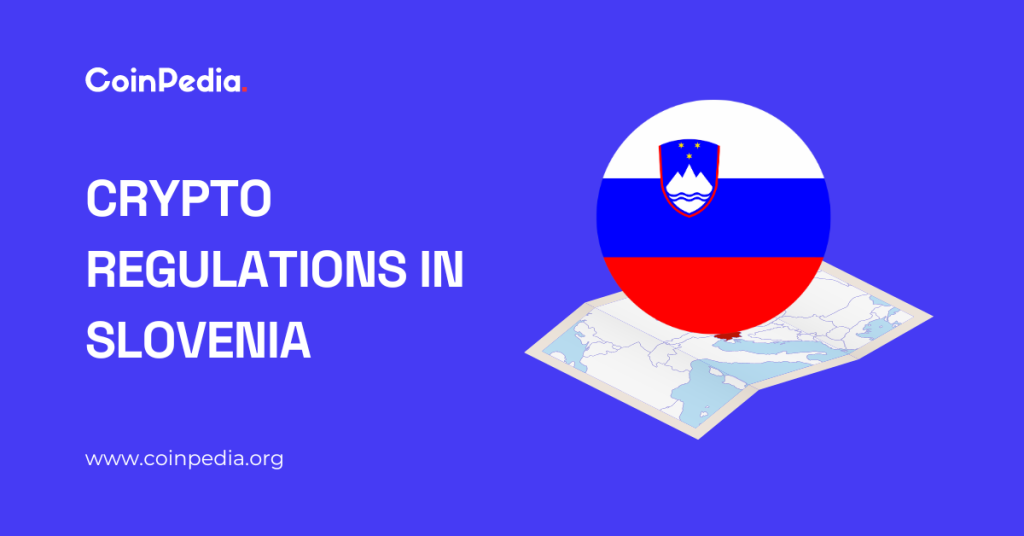
The post Crypto Regulations in Slovenia 2024 appeared first on Coinpedia Fintech News
Slovenia is a small, but highly developed, country in Europe. It has a population of 2.1 million people. The country owes its rich industrial history for the enviable economic situation it at present enjoys. Undoubtedly, it is the most economically developed Slavic nation. Since its 2007 Euro adoption, the country has been growing consistently. This country is always open towards innovation. Otherwise, it would not have achieved this much in the industrial sector. No wonder why the country is now a favourite destination of crypto enthusiasts. There are reasons to believe that Slovenia is likely to become one of the most powerful fintech hubs in Europe. Without a futuristic crypto regulation framework, it is nearly impossible to establish a powerful crypto economy. Let see whether the present crypto regulation in Slovenia is enough to help it achieve big in the cryptocurrency landscape. My expectation is positive. What’s yours? Wait, before you give an answer, please go through this?
1. Crypto Regulations in Slovenia: An Overview
Slovenia is popular for its pro-innovation attitude. It is always keen to provide a supportive environment for emerging technologies. Naturally, blockchain and crypto innovations receive support from the country. Cryptocurrencies are classified as virtual assets, not financial instruments or monetary assets, as per the Act on Payments Services and Systems. The country understands the importance of regulating its crypto sector. There is no single authority in the country to regulate the sector. Instead, each aspect of the crypto ecosystem is regulated by an authority highly competent to manage that aspect. For example, cryptocurrency transactions are overseen by the Bank of Slovenia and the Securities Market Agency. What they check primarily is whether a crypto transaction complies with financial laws, including Anti-Money Laundering and Anti-Terrorist Financing regulations, or not. The Slovenian Prevention of Money Laundering and Terrorist Financing Act (ZPPDFT-2) incorporates the EU’s 5th Anti-Money Laundering Directive (5MLD). It aligns with the latest FATF recommendations. The ZPPDFT-2 requires all virtual currency service providers to register with the Office of the Republic of Slovenia.
2. Crypto Regulations in Slovenia: What’s New
Here are the major developments in the crypto sector in Slovenia this year.
May 14, 2024: NiceHash announced Slovenia’s first Bitcoin-focused conference, NiceHashX. The event is set for November 8–9, in Maribor.
July 25, 2024: Slovenia issued a Euro 30 million sovereign digital on-chain bond, the first of its kind in the EU. The bond, offering a 3.65% return, will mature on November 25, 2024.
3. Crypto Taxation Framework in Slovenia Explained
Slovenia’s crypto taxation framework offers clear guidelines for individuals and corporations dealing with cryptocurrencies. As per the guidelines specified by the Financial Administration of Slovenia, the prime factors that determine one’s tax treatment is the trader’s status and the nature of the transaction.
For individuals, income earned from cryptos, whether from employment or ongoing business activities, is subject to personal income tax. Notably, capital gains from trading or market fluctuations are exempt from taxation.
For corporations, any capital gains from cryptocurrency activities are subject to a corporate income tax of 19%. The Value-Added Tax generally applies at a rate of 22%. Cryptocurrency transactions considered as means of payment are exempt from VAT. Companies are prohibited from restricting payment methods to cryptocurrencies alone.
Tokens issued during ICOs must be accounted for following standard accounting rules and the Law on Corporation Tax.
4. Crypto Mining in Slovenia: What You Should Know
There is no restriction for crypto mining in Slovenia. Income from mining is considered as business income. So, income from crypto mining is taxable. This includes both the rewards you earn from validating transactions and any additional income from your mining operations. Miners should comply with Slovenian tax regulations. The said tax treatment is applicable not only to individuals, but also to legal entities.
5. Timeline of the Evolution of Crypto Regulations in Slovenia
Here is the timeline of the evolution of crypto regulations in Slovenia.
2013: The Slovenian Financial Administration issued guidelines stating that income from cryptocurrency transactions should be taxed.
2017: The Financial Administration of Slovenia provided more detailed guidelines on cryptocurrency taxation. As per the guidelines, taxation depends on factors such as the trader’s status, the type of transaction, and other individual circumstances.
2023: The EU adopted the Markets in Crypto-Assets Regulation (MiCA), establishing a uniform regulatory framework for crypto-assets, their issuers, and service providers across the EU.
Endnote
Slovenia’s approach towards the crypto sector is commendable. The crypto regulation framework Slovenia has developed reflects the country’s optimistic view about its crypto future. The country’s crypto regulation landscape is balanced in nature. It is keen to provide a supportive environment for crypto innovation. At the same time, it does everything possible to ensure that the rights of users are protected. It has implemented several measures to ensure no illegal activities are possible in the country’s crypto environment. The latest developments in the crypto regulation environment indicates that the country is always keen to improve its regulation framework. The Slovenian crypto regulation framework sets a positive example for other nations navigating the evolving crypto landscape
Also Read: Crypto Regulations in Hong Kong 2024
#Cryptocurrencyregulation #CryptoRegulations [Source: Coinpedia]

